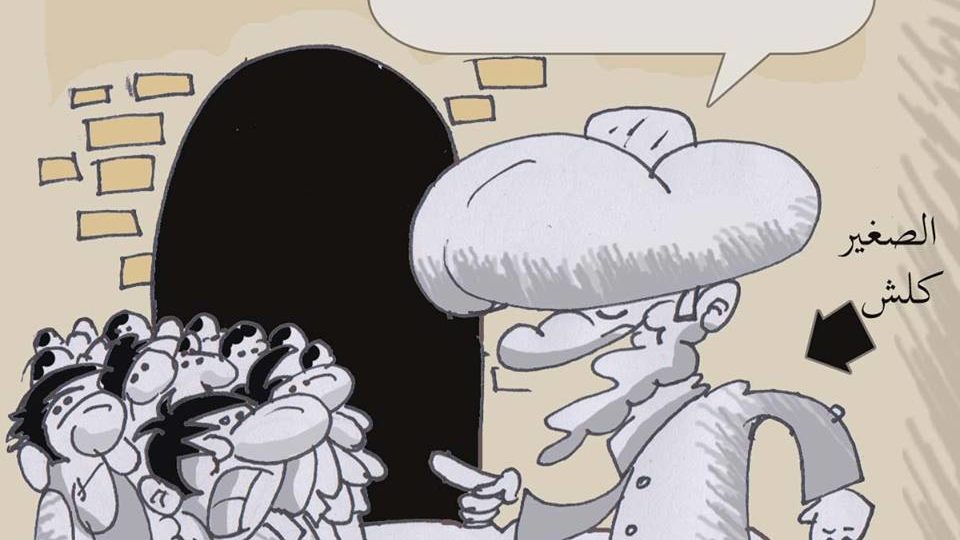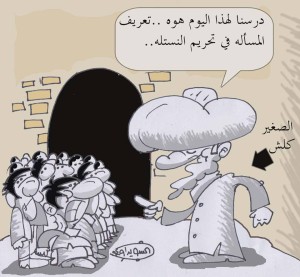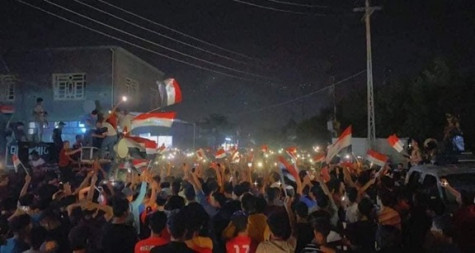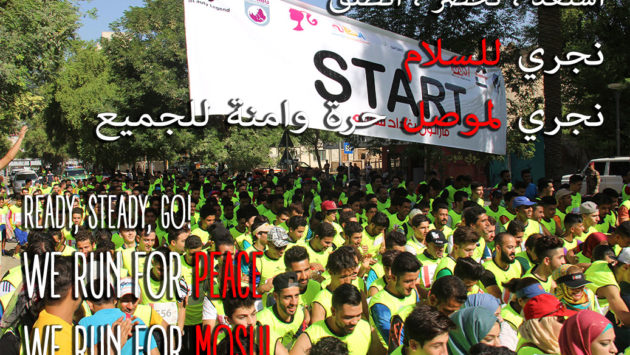Freedom of Expression is Severely Threatened: Attacks on Journalists and Human Rights Defenders are Multiplying and the Government is Powerless to Stop Them!
Iraqi Civil Society Solidarity Initiative (ICSSI)
March 2016
With the growth of peaceful protests and demands for radical change and reform of the Iraqi government in response to rampant corruption and the failure to provide services, risks for activists, journalists, and other human rights defenders, who are the backbone of the protests, are increasing.
Assault on Cartoonist
The cartoonist Mohammed Al-Swedawi was subjected to threats and assault by unknown persons late last February, after he published a caricature criticizing the pronouncements of the religious leader, Jalal Al-Din Al-Saghir. Al-Saghir had demanded that people practice austerity and stop complaining about poor services, saying that citizens should give up eating chocolate and live on only 30,000 Iraqi dinars a month (the equivalent of 20 Euros)!
Al-Saghir is a well-known cleric belonging to the Supreme Council of Iraq, a political party with a large presence in the Iraqi parliament and the principal bloc supporting the current government. The Supreme Council directs the activities of several armed Shiite forces, including the “Badr Corps”.
Al-Saghir’s statement sparked the ire of the Iraqi Street, where large numbers mocked his statements, in which he entirely overlooked the main causes of the crisis and held simple citizens responsible. A number of videos, cartoons and poems were made public denouncing the cleric’s position and demanding that he apologize to the Iraqi people.
Muhammad Al-Swadiawi, one of the activists who expressed criticism of Al-Saghir, posted a caricature mocking how the cleric linked chocolate with the economic crisis Iraq is experiencing. Because of his cartoon, Al-Swadiawi was violently attacked and could have been killed, yet there was no investigation of the incident and the offenders have gone unpunished.
Al-Swaidawi wrote about the details of this incident on social networking pages: “I went out of my house and before I arrived on the public street, someone called me by my last name. I thought I knew him, but when I looked I saw a stranger accompanied by three other persons. He began to beat me and then the other three started beating me also. One of them hit me on my head with an iron bar.” He added, “I was injured in my back. I went to a nearby hospital where they stitched my head”. The activist also said that the attackers threatened him, saying: “Next time we will cut off your hands that painted the cartoon. It will be your end”.
Al-Swaidawi called for protection and to make the Iraqi and international public aware of the dangers confronting him and everyone who criticizes powerful clerics and Iraq politicians.
Erbil: Repeated assaults on journalists by security forces of the regional government of Iraqi Kurdistan
For the second time, a team from the KNN satellite channel were beaten and had their equipment confiscated by armed security force in the province of Erbil, while they were working. The Press Freedom Advocacy Association representative in Erbil reported that KNN staff experienced verbal and physical abuse by members of Asayish, a subsidiary of the security forces of Erbil, as KNN attempted to cover a sit-in by a number of doctors and other Rabreen Hospital staff, which was organized to protest threats that had been made to one of the doctors by a regional government official.
KNN reporter, Salih Harki said that he and two of his colleagues went to the hospital to cover the sit-in by the doctors. At eleven o’clock in the morning they were attacked by three armed members of Asayish who came to the hospital at the request of the hospital guards. They beat the photographer, Karzan Kake Rash, and took his equipment, all the while shouting obscene words at him and his other colleague, the reporter Mohammed Samad. Harki added that they had come to the hospital to report on the protest, to investigate the reasons that caused the doctors to protest, and to speak with the official who allegedly threatened one of the doctors.
Diwaniya: Guards of the Iraqi President Fuad Ma’sum attack a number of journalists
The Press Freedom Advocacy Association reported that guards of President Fuad Ma’sum attacked a photographer from Afaq TV and then prevented 15 other photographers and reporters from entering the Diwaniya provincial building. A reporter from Al-Ghad Press, Mohamed Al-Shammari, told the Press Freedom Advocacy Association that the group of Iraqi journalists were trying to cover the president’s visit to the province, but the president’s body guards blocked journalists’ entry and when the photographer from Afaq TV, Walid Aoun, attempted to record their actions several of the body guards beat him, destroyed some of his equipment, and held him at gunpoint. Al-Shammari added that the photographer tried to evade the guards, but they chased him and confiscated his equipment.
Samawa: Security forces under the leadership of Al-Rafideen operations attack reporters of Al-Hurra Channel
As they were preparing a report on one of the salt production plants in Samawa, security forces under the leadership of Al-Radfideen operations assaulted a number of journalists. The Press Freedom Advocacy Association in Iraq reported that a correspondent from the Iraqi Al-Hurra Channel was reporting on the deployment of a military force in Samawa, which is one of the most famous salt-producing districts in Iraq; the correspondent had gone to the area to conduct media coverage and meet with the Governor of Samawa.
After the reporters passed the first security checkpoint, they were prevented from entering the plant, under the pretext of lack of formal approvals from the leadership of Al-Rafideen operations. One reporter went to the headquarters of the operations, but the commander was not present. The reporter then returned to the plant to meet with truck drivers carrying salt, but they were surprised by an attack by the security forces who shouted verbal insults at the reporter, the photographer and his assistant. The security forces confiscated their mobile phones and all that they could carry of their photographic equipment. Then they beat the reporter, Ahmed Al-Saidi. Al-SAidi said that the attack did not end there, as the security forces later files a lawsuit against the journalists for illegal media coverage.
Impunity must end!
This problem of impunity – when attacks on journalists and other human rights defenders go without legal prosecution and are therefore unpunished – is a most serious threat to freedom of expression. This is all the more so since often the offenders are from government security forces or are the security guards of officials or known members of the government.
The Iraqi government, under the Iraqi constitution and in accordance with international human rights standards, is responsible for protecting freedom of expression and human rights defenders in Iraq. The Office of Human Rights at the United Nations Assistance Mission for Iraq [UNAMI] specifically drew the attention of the Iraqi government and the Kurdistan Regional Government to this responsibility. There is urgent need to address the phenomenon of impunity and to fully protect the rights of freedom of expression and human rights defenders in Iraq. This must include investigating all of the cases mentioned above and others recorded by human rights organizations, and seeing that where there are human rights violations the victims receive justice.
The Iraqi Civil Society Solidarity Initiative is deeply concerned that a failure to act will allow those who seek to abolish freedom of association to prevail.




